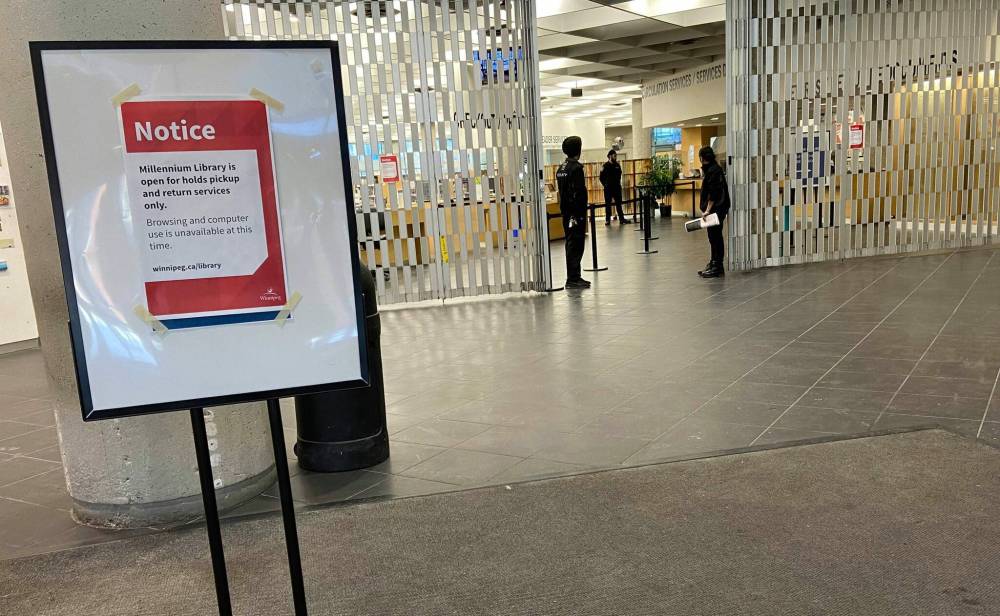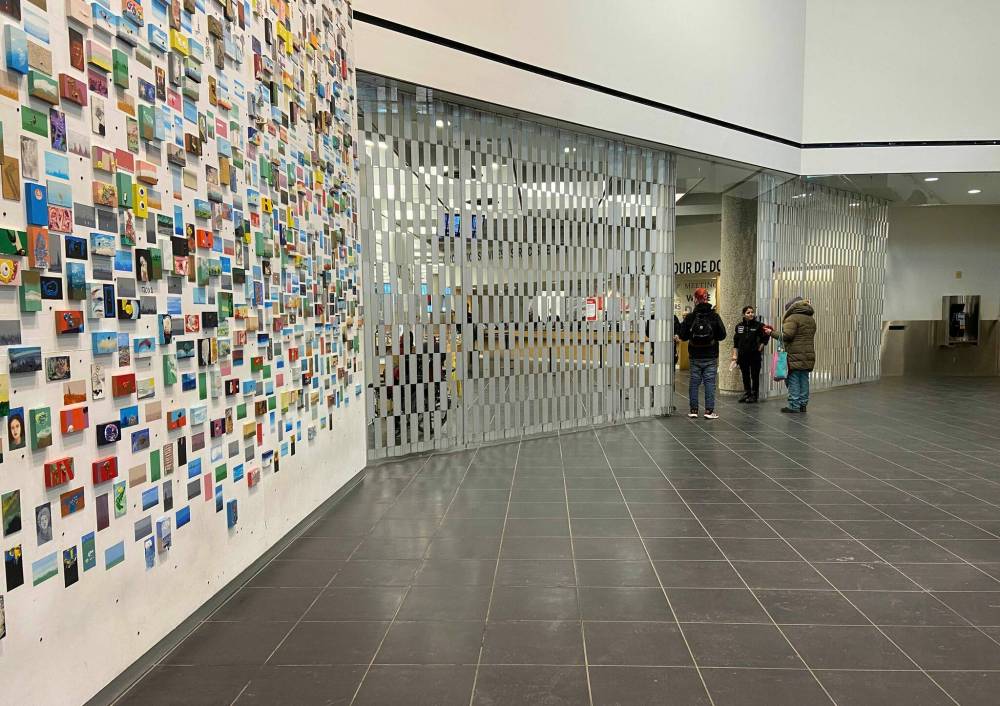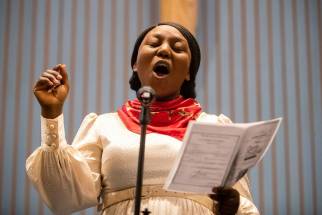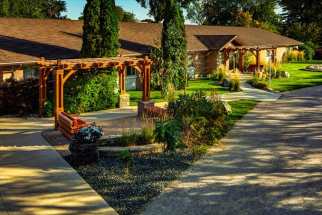Millennium Library unlocks doors after lobby slaying Available services extremely limited; regular patrons, advocates say full resumption can’t come soon enough
Read this article for free:
or
Already have an account? Log in here »
To continue reading, please subscribe:
Monthly Digital Subscription
$0 for the first 4 weeks*
- Enjoy unlimited reading on winnipegfreepress.com
- Read the E-Edition, our digital replica newspaper
- Access News Break, our award-winning app
- Play interactive puzzles
*No charge for 4 weeks then price increases to the regular rate of $19.00 plus GST every four weeks. Offer available to new and qualified returning subscribers only. Cancel any time.
Monthly Digital Subscription
$4.75/week*
- Enjoy unlimited reading on winnipegfreepress.com
- Read the E-Edition, our digital replica newspaper
- Access News Break, our award-winning app
- Play interactive puzzles
*Billed as $19 plus GST every four weeks. Cancel any time.
To continue reading, please subscribe:
Add Free Press access to your Brandon Sun subscription for only an additional
$1 for the first 4 weeks*
*Your next subscription payment will increase by $1.00 and you will be charged $16.99 plus GST for four weeks. After four weeks, your payment will increase to $23.99 plus GST every four weeks.
Read unlimited articles for free today:
or
Already have an account? Log in here »
Hey there, time traveller!
This article was published 23/12/2022 (1087 days ago), so information in it may no longer be current.
Gibson Kelchi bundled up and trudged through the snow and bitterly cold air to the Millennium Library Friday morning.
The downtown library, which had been closed almost two weeks after a fatal stabbing in its lobby, unlocked the doors at 10 a.m. for the first phase of its reopening — returns and reserved pickups only.
Kelchi, a student at the University of Manitoba, had hoped to use a printer but he was greeted by three security officers who told him about the limited services available and gave him a list of other library branch locations.
MALAK ABAS / WINNIPEG FREE PRESS Friday was the first day of the Millennium Library’s “phased service resumption” since it closed to the public after a fatal stabbing Dec. 11. 
Kelchi lives close to the facility at Donald Street and Graham Avenue and is a frequent visitor. The lengthy closure has been difficult for him and many other downtown residents, some of whom have difficulty getting to other library branches, particularly in the frigid weather.
“ I feel (the closure is) too much, because you’re just stressing people,” he told the Free Press while standing outside of the building. “Somebody could need a service in the library and it’s closed, nothing is going on. So it’s either you find the closest library, which, if you don’t have a car, you have to walk in the cold.”
While the city, union and community groups discuss what security and other changes are required before all services are expected to resume in mid-January, Kelchi said he hopes it happens quickly.
“Safety is first, and people need the services. If the alternative is to provide more security, let them do it, because I think the safety of the people using the library should come first,” he said, but added the current situation is “bad, really bad.”
“A lot of people are walking out of here right now, and they have stuff to do.”
Tyree Cayer, 28, was slain in lobby after a verbal dispute grew violent on Dec. 11. Four teenage boys between the ages of 14 and 16 are in custody, facing second-degree murder and manslaughter charges.
The city is conducting a risk-assessment and safety audit of the building, and is considering a possible “permanent redesign” of the lobby. Safety concerns led to the imposition of airport-style bag searches and hand-held metal detector scans in 2019, leading to an outcry about privacy concerns, among other issues. The security measures were removed last year.
The union that represents employees has been supportive of the phased reopening, and Canadian Union of Public Employees Local 500 president Gord Delbridge said there was some apprehension among the library staff returning to work.
“There was a lot of anxiety,” he said. “They felt that their safety was compromised, and they want to feel safe in their workplace, doing the job that they love and serving the citizens, and they didn’t feel safe,” he said.
He said the union is pushing for increased security, but based “in-house.”
“Where they would be able to invest in training, to make sure that they are trained in conflict resolution, racial-profiling, mental-health awareness, those kinds of things,” he said. “And maybe more of a more permanent-type commitment, where they can form relationships, and know the staff rather than a turnover of profit-driven, private contractors.”
MALAK ABAS / WINNIPEG FREE PRESS All services are expected to resume at the Millennium Library in mid-January. 
Members of Millennium For All, an advocacy group that previously fought the lobby security measures said they’re in conversation with the union, library staff and city officials. The idea of in-house security, member Joe Curnow said, came from a report released by the group in 2019.
Another possibility that Curnow, an assistant professor at the University of Manitoba, said has sparked interest with library staff the group has spoken with is investing in the community connections space — which sits in the lobby of the library and provides city-staffed community crisis workers and library employees who can connect visitors to support services. Before the closure it was open only 10 a.m.-4 p.m. most weekdays and not at all on the weekend.
“So far, it hasn’t been staffed adequately,” Curnow said. “And that’s true of the whole library, honestly, if we compare it to other systems. And that’s one of the biggest things that research shows that keeps library users and library staff safer, is having a higher staff-to-user ratio. So that’s, I think, a huge thing for the city to commit to invest in.”
She said she’s seen a strong resolve in library staff to advocate for low-barrier safety measures to be implemented.
“We all want this library to be safe, we want it to be accessible, we want it to be anti-racist, we want to remove the barriers to entry. I think that there’s a lot of shared commitment to doing that, and the commitment to saying we’re not going to go back to strategies that we know don’t work, and we’re not going to go back if there’s not a real commitment to funding something that’s meaningful,” she said.
“By meaningful, I really mean these research-based approaches that are not going to be the short-term Band-Aids that can make a couple of politicians feel better, but don’t fundamentally make anyone safer.”
malak.abas@freepress.mb.ca

Our newsroom depends on a growing audience of readers to power our journalism. If you are not a paid reader, please consider becoming a subscriber.
Our newsroom depends on its audience of readers to power our journalism. Thank you for your support.
















